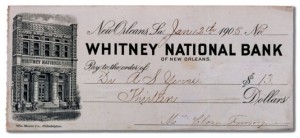Scenario 1
As you approach your bank’s ATM you see a young woman approach. She’s got a check in her hand and then begins to tell you a tearful story about how she’s lost her ID card and can’t cash her paycheck. Her baby’s out of diapers and she doesn’t know what to do. Haltingly, she asks “Would you deposit her paycheck into your account and give her cash?” She’ll even let you keep a few twenties for your trouble.
Scenario 2
You’re looking for a job opportunity to make a little extra cash. You answer an ad on Craigslist for a “work at home” job. You email the person posting the ad and they explain that you’ll be a “mystery shopper” for this company. They will mail you checks and you will deposit them into your account and purchase a “Green Dot Moneypack” with part of the money and then send it to them. The rest of the money you can use to make purchases. Oh, they almost forgot, once you make the purchases you can let them know how your shopping experience went.
Scenario 3
A letter comes in the mail addressed to someone with a similar but not quite exact name as yours. The return address is from someone out of state that you don’t recognize. You open the letter and inside you find a check drawn on the account of someone different than the return address on the letter. There is a slip of paper with instructions to email a third person on receipt of the check for further instructions. Out of curiosity you email them and they instruct you to deposit the check into your bank account, purchase a money order for an amount less than the check, send the money order to another person and keep the remainder for yourself.
Each one of these scenarios is part of the growing trend of Fake Check Scams. These scams work like this. A scammer dupes an unsuspecting victim into depositing a fake check, counterfeit check or check drawn on a closed account into their bank account. Under Federal banking laws, banks and credit unions are required to make money available to you quickly after you deposit the check into your account.
However, it usually takes much longer for a check to actually clear and money to be transferred into your account. Scammers use this difference to their advantage. By the time the scammer’s check is discovered to be bogus, they already have their money. Also, since you withdrew money from the account before the money would have transferred; you are responsible for it and are out the amount of money you took out.
The Federal Trade Commission has this warning regarding these scams:
“However, just because funds are available on a check you’ve deposited doesn’t mean the check is good. It’s best not to rely on money from any type of check (cashier, business or personal check, or money order) unless you know and trust the person you’re dealing with or, better yet — until the bank confirms that the check has cleared. Forgeries can take weeks to be discovered and untangled. The bottom line is that until the bank confirms that the funds from the check have been deposited into your account, you are responsible for any funds you withdraw against that check.”
To add insult to injury, most of these scammers have disguised their identity and origin with multiple layers of obfuscation and many are not located in the same state or even in the same country. This makes the likelihood that police will catch them very remote. Your local police department just doesn’t have the resources to devote to solving a case like this for what is a relatively small loss.
What’s your best defense to becoming a victim of a scam like this? One word:
“No”
Tell these scammers that you will not participate in this scheme, you will not deposit the check into your account, and you are not interested in assisting them or being a part of it.
That one simple word can save you a whole lot of grief.

